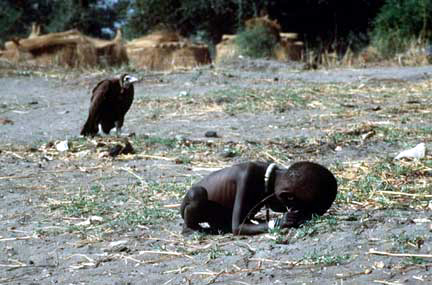
 |
It seems to be the week of wondering aloud about the morality of mankind. A few days ago I was thinking about how countries treat their own citizens (the Holocaust), and how countries act towards people in need in other countries (Rwanda, the Sudan). Now I'm thinking about how we as individuals treat others.
Specifically, I'm thinking about Kevin Carter.
Kevin Carter was a photojournalist from South Africa who made a career of being right in the middle of suffering and strife. He took amazing photos documenting the atrocities in various African countries, as well as Kosovo. He took one amazing photo in particular:

This is a photo of a starving child. The child is trying to make its way to a feeding station in the distance, out of frame, in the hamlet of Ayod, in southern Sudan, during a time of widespread famine in the area. A vulture is shadowing the child, waiting for it to die so that it may feed.
It is a powerful, unsettling photo. There are specific instances when I believe images convey a story more precisely than words ever can, and that is one of those instances. Sometimes a concept - starvation, mass wartime casualties, etc. - is so abstract that merely reporting the facts doesn't really make a connection with a reader. We read the headlines - "Firefight Kills 25 Marines In Fallujah" - and we understand that a lot of people died, but the true realization of what that means is often not fully felt just by reading the words. As much as I love words, they can at times be antiseptic, especially if you do not have a preexisting, personal connection to the subject. This is especially true in hard news reporting (as opposed to feature writing).
But show us an image depicting starvation, or an image showing the flag-draped caskets of those 25 marines who were killed in action, and we often then have a much fuller understanding of the concept.
So for that reason, I think Carter's photo is an important one. The world agreed - the image won Carter the Pulitzer Prize for Feature Photography in 1994.
All Carter had to give up for it was his soul.
He watched this child pull her body along the ground for TWENTY MINUTES in a desperate effort to get to the feeding station, but he did nothing. He did nothing. He was waiting for the vulture to spread its wings so that he might get "the perfect shot." How disappointed he must have been that the vulture wouldn't cooperate.
I understand full well that journalists are supposed to be fair, impartial observers to the events they are documenting. I lived that life for almost 10 years; I know what it means. I know we aren't supposed to become participants, no matter how much we want to.
But Carter got his shot. He had finished being the observer. And yet he still did nothing. Oh, I guess he should be given some modicum of credit for chasing the vulture away. Good show. But then he ran off instead of helping the child reach the feeding station. He could have picked her up and taken her there himself. And if that seemed too much like participating - a line he didn't want to cross - he could have gone to the feeding station and directed them to the child.
But he did nothing.
Where was his soul?
How could he just leave the child there to die?
I could understand his behavior if he was in a position where he was forced to make a decision between getting the photo - an image that would "make the world weep" and do a great public service by helping people better understand what starvation looks like - and helping the child. But he didn't have to choose one or the other; he could have done both. I will never understand why he chose not to.
Carter committed suicide two months after receiving the Pulitzer Prize.
Posted by Highwaygirl on April 23, 2004 08:21 AM to the category Current Affairs